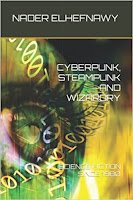In writing
The Secret History of Science Fiction I had occasion again to consider the opprobrium to which self-publishing is subject--not least, from professional authors. Those familiar with the subject here have heard the laundry list of standard complaints innumerable times--the poor quality of the writing, editing and copyediting of much self-published work, for example (a charge often exaggerated and sanctimonious, given the actual quality of traditionally published work, but not wholly baseless). Still, it does seem to me that there is an element here insufficiently appreciated, precisely because that bit of sociology is rarely raised in the mainstream
save by an occasional Thomas Frank (who would seem to have worn out his welcome in the mainstream in the process), namely the fact that writing has become a profession in the strict sense of the term, and that professionals tend to approach the world in certain ways.
As Frank argued from an in-depth knowledge of the relevant subject matter people hear the word "professional," and, I suppose, tend to make positive associations. They think of someone who is supposed to know what they are doing, because of what they are supposed to have been subject to before entering their profession. They are supposed have been trained, lengthily; tested, arduously; certified, impeccably; and now as professionals are part of a community of professionals upholding high standards in the public interest, not least by making sure that their members adhere to those standards--and in the event of a breach, may withdraw the professional standing they have been accorded.
However, even without getting into the question of the extent to which professionals and their organizations really live up to this lofty expectation, there is
the rest of the package. As sociologists of the professions have observed, professions entail some group claiming a monopoly over some aspect of life, and saying "No one else is allowed to do this. Anyone else doing this is illegitimate, because this is our turf." Where that turf is concerned they stand in relation to society as an Authority, holding that "Where this matter is concerned, you simply have to accept our say-so, because we know everything and everyone else knows nothing--AND THIS MEANS YOU!" Where the profession's say-so is concerned an internal hierarchy holds sway, with the senior and more powerful setting the party line--and even insiders who question that line suffering the consequences. One can make the case for all of this being used to protect the public--for example, by insuring that practicing doctors are properly trained, keeping frauds and quacks marginalized, making sure that those properly trained, non-fraud and non-quack doctors perform as they ought. However, all this gives the profession, and especially its more highly placed members, a very great deal of power indeed--which serve an interest that may not always align perfectly well with what is best for the community as a whole. Indeed, just as the word "profession" evokes a priesthood, and a profession as described here can be very much like a priesthood, a profession can easily become a
corrupt priesthood looking out for itself at the public's expense, subordinating everything it says and does to a selfish sense of entitlement, crassness—the nastier for being wrapped up in elitism. (Indeed,
"All professions are conspiracies against the laity" the great George Bernard Shaw once wrote, and I have yet to see evidence that he was wrong--with the play in which he wrote that line, far from insignificantly,
The Doctor's Dilemma, where the practice of the medical community specifically was at issue.)
For writers to act as professionals is for them to behave in this way--to say that we have the right to a monopoly over the creation of fiction for the broader public. No one who is not one of our group should be doing so. And you are not right to question our judgment about who is allowed into the group and who is not.
That said, if all professions all make certain claims the professions do not all stand on equally firm ground as they press those claims, with medicine, again, an excellent example. One may argue, for example, that
the American medical profession strives to limit the supply of doctors, and to keep even licensed medical personnel who are not physicians from performing duties within their capacity, simply to limit the supply of needed medical care and artificially raise its price. However, if more than a few seem to think that the business practice of the profession can and should be reformed, perhaps even very significantly reformed, few would deny the value of formal training and credentialing in medicine altogether--the more in as opportunities to learn to perform many of the requisite activities outside of them are slight. (Can you picture anyone learning to become a brain surgeon on an amateur basis?)
But authorship is a very different thing. Someone toiling all on their own may be at a disadvantage to someone who has found entree into the business, mentors, apprenticeship opportunities, practical chances to "learn-by-doing" in a genuine commercial environment while getting a paycheck for it. But it is far easier to learn to produce an at least passable manuscript (it is the passable, not the great, which pays the industry's bills) on an amateur basis than it is to learn brain surgery that way.

The result is that, for all their scorn of self-published novels, the "professionals" know full well that here is genuine competition for readers, competition not only on price (with 99 cent e-books having an obvious attraction against books going for $9.99), but competition that undermines a significant basis for their selling books at all--the "mystique" of authorship that came with the production of their books being costly, with opportunities to publish open to a very few, who are presumably somehow "special" in getting those rare opportunities traditional publishing afforded. How one goes about it seems totally opaque to most, while many who do know something about it are aware of how many visible and invisible barriers there are to being one of these Elect. And it is this mystique that we see publicists exploiting in those sanitized biographical blurbs which
cut the grubby day jobs and grubby writing jobs before the big hardcover out of their biographies, in book tours that have them on TV and autographing copies in bookshops and the rest with that air of self-satisfaction that has become such a pop cultural cliché.
Resting critically on the fact that it was very hard to get one's name into print, today's print-on-demand and other self-publishing technologies change that fact and undermine that mystique--very likely making many who had not done so before look more closely at the contents of those big, expensive hardbacks, and realize that, contrary to the critical praises on the back cover, perhaps the more in as they compare it to those much-maligned 99-cent books, or even the stuff up on a site like Wattpad or FanFiction.Net, what is between the cover is not really so special after all, that far from being a genius the self-satisfied book-signer is offering up more Hollywood Hogwash, more Malarkeys, more Dreck Squad (as is especially the case when we are, as is happening more and more often, talking about some Big Name who doesn't do much more than slap their name on jaw-droppingly generic books slapped together by jobbing hacks). And perhaps after that decide that they have better things to do with their thirty-five dollars than snap up that hardcover . . .
Bad enough for business in itself, all this would seem more worrisome still in a period in which
writers are seeing their earnings collapse, not least because readership is, contrary to what many a Pangloss would have us believe, in decline, with
even such reliable genres as the sturdy commercial thriller apparently taking a hit this past year.
All that would seem plenty to lend a particularly nasty edge to the denunciation of those the pros see as encroaching on their turf, making already tough careers harder for all but the super-stars (who may themselves be starting to feel the heat)--while one might add that the nastiness is uninhibited by fear of the people they pick on being able to fight back. Self-published writers, by and large, lack significant media platforms. If they had them, after all, they probably would not have gone
the far harder and much less remunerative road of self-publishing--while
commanding little sympathy from anyone who does have such a platform--so that as the bashing of their kind goes on in the organs of the mainstream media, they can
do little but offer their replies on personal blogs no one ever sees in an age in which ad revenue-collecting, "authoritative source"-favoring search engine algorithms make it ever harder to find them, or anything else of the kind.







